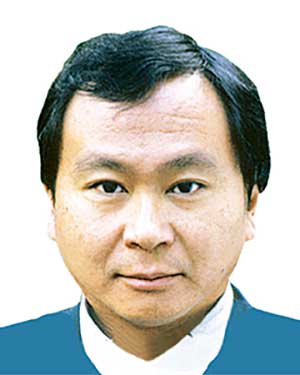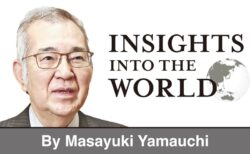11:00 JST, February 21, 2025
Prior to last November’s election, there was public discussion of whether Trump was a fascist. I thought at the time that this charge was exaggerated; there’s no clear definition of fascism, and comparisons of Trump and Hitler seemed very overdrawn. Well, Trump was inaugurated on Jan. 20, and while he may not be a fascist, he is certainly an authoritarian. Authoritarian leaders do not want to be constrained by checks and balances or by international norms, and are willing to defy the law in order to get their way. Trump has already done this in countless ways.
Since Jan. 20 the White House has issued dozens of executive orders reshaping the U.S. government. Many of these are plainly illegal and/or unconstitutional. Let’s begin with the role that billionaire Elon Musk has been given by the president. The U.S. Constitution says that only Congress has the authority to spend money and create federal agencies to manage policy. Trump has empowered Musk, a private citizen, to lead something called the “Department of Government Efficiency,” or DOGE, which as we speak is going over the federal budget and marking items for elimination.
Musk has announced that the U.S. Agency for International Development (USAID) will be closed, and all of its employees fired. This eliminates one of America’s chief soft power instruments, which is why Russia and China are cheering. USAID itself was created by an act of Congress, and cannot be closed except by another of Congress, but neither Trump nor Musk care. China has other reasons to be pleased that this billionaire has such a prominent role in the new administration, since Musk’s Tesla derives much of its revenue from China, giving the latter great influence over him.
On the first day of his administration, Trump pardoned some 1,500 individuals convicted of storming the Capitol on Jan. 6, 2021. Many had physically assaulted police officers, leading to suicides or long-term disability on their part. Not only that, he is turning the Justice Department against itself: he has demanded the resignations of all of the hundreds of FBI agents involved in the criminal investigations of himself, and has vowed to launch criminal investigations against them. Many of the convicted rioters were members of militia-like right wing organizations like the Proud Boys; Trump has in effect given them permission to use violence against his enemies in the future as they did on Jan. 6.
Perhaps the most egregious executive order proclaimed by Trump is the one overturning birthright citizenship. The plain language of the 14th Amendment, passed in the wake of the Civil War, says that “all persons, born or naturalized in the United States, and subject to the jurisdiction thereof, are citizens of the United States.” A president has no power to unilaterally alter the Constitution, but that hasn’t stopped Trump from trying.
It is in the realm of foreign policy, however, that some of Trump’s most extraordinary actions have taken place. Prior to the election, it seemed safe to assume that Trump’s instincts were isolationist. He criticized America’s involvement in the “forever wars” in Afghanistan and Iraq, disparaged NATO allies, and warned that American support for Ukraine risked World War III. But beginning with his inaugural address on Jan. 20, he pivoted to being an old fashioned imperialist. He announced his intention to reclaim the Panama Canal, and threatened Denmark with harsh tariffs if it did not cede control of Greenland to the United States. Trump’s moves seemed like aggression for aggression’s sake, since the Danes had indicated earlier that they were happy to grant America a greater security role and mining rights in Greenland. Trump instead insisted on threatening them with the use of military force if they didn’t comply.
This creates an unprecedented situation. NATO’s Article Five calls for mutual support if one of its members is attacked. It has no provisions for what to do if one NATO member attacks another one.
Trump’s crowning act as a neo-imperialist was his recent suggestion that America take control of the Gaza Strip after emptying it of its roughly 2 million Palestinian inhabitants. This proposal was so outlandish that it was immediately rejected by virtually all regional powers, except for the extreme right-wing members of Israeli Prime Minister Bibi Netanyahu’s coalition. They are happy because it would take a huge problem off Israel’s hands, that is, what to do with the wrecked and desolate Gaza Strip that is still teeming with Hamas fighters. They would be happy to see what in effect would be the ethnic cleansing of an important part of the Middle East.
As in many of Trump’s initiatives, it is hard to know how seriously the rest of the world should take him. His Gaza plans are so absurd that there is no way they can be realized. But they may be a distraction from something that is much more likely to happen: the Netanyahu government would like to declare Israeli sovereignty over the whole of the West Bank and its nearly 3 million Palestian inhabitants, and the Trump administration may well declare its support.
Even if Trump’s threats to Panama, Greenland and Gaza are hollow, they set an absolutely terrible precedent. One of the great achievements of the post-1945 world was acceptance of a general norm that great powers should not use military force to grab someone else’s territory. This norm was massively violated by Putin’s Russia in 2014 and 2022 when it annexed parts of Ukraine, and China has been contemplating the use of force to retake Taiwan. Trump has basically given them a green light, reviving the 19th-century idea of spheres of influence. Russia’s claim to Ukraine and China’s claim to Taiwan are stronger than America’s claim to Panama or Greenland.
Trump is seeking to centralize power in the presidency and to remove the checks and balances that limit his authority. There is a deep constitutional issue underlying all of these actions. The U.S. Constitution holds that Congress is the central policy-making body, and that the president’s role is simply to “take care that the Laws be faithfully executed.” The president’s direct authority lies primarily in foreign policy and as commander-in-chief of the armed forces. Over the years Congress has passed numerous statutes regulating the behavior of the executive branch, creating and funding agencies, setting rules for hiring and firing officials, and for scrutinizing executive branch officials and their behavior. The Trump administration by contrast wants to concentrate power not just in the executive branch, but in the person of the president himself. This constitutes authoritarian government.
The original theory of the American Founding Fathers was that the different branches of government would check one another. Even if they were controlled by the same party, they would have an interest in maintaining their separate authority. Today’s Republican Party has abdicated its responsibility to watch over the executive branch. Trump appointed clearly unqualified individuals like Pete Hegseth at Defense, Tulsi Gabbard for director of National Intelligence, Kash Patel at the FBI, and Robert F. Kennedy Jr. at Health and Human Services. Nonetheless, most of them have already been confirmed by the Republican Senate. Such is Trump’s power to intimidate members of his own party.
What is going to prevent the United States from going the way of Hungary and becoming an openly authoritarian country? The only remaining institutional check is the courts, which will have to decide on the dozens to lawsuits seeking to block implementation of Trump’s executive orders. This sets up a potential constitutional crisis if the president decides to defy a court decision he doesn’t like.
The other check will be external. Trump’s plans for use of tariffs and mass deportations of undocumented immigrants are as poorly thought out as his plans for Gaza. They will lead to trade wars, retaliation, and rapid inflation which his supporters will immediately feel. A Chinese move on Taiwan has suddenly become much more likely. Trump may be distracted waging economic war against allies and seizing Panama and Greenland. The low probability that he will undertake a defense of that island makes a Chinese move much more likely. His plans for peace in Ukraine may also collapse, leading to new Russian threats to Europe.
All of this sets the stage for a failed presidency. Trump at this point may disappoint his domestic supporters, but the world will have paid a huge price in the meantime.

Francis Fukuyama
Francis Fukuyama is a senior fellow at Stanford University’s Freeman Spogli Institute for International Studies.
The Japanese translation of this article appeared in The Yomiuri Shimbun’s Feb. 16 issue.
Top Articles in Editorial & Columns
-

Riku-Ryu Pair Wins Gold Medal: Their Strong Bond Leads to Major Comeback Victory
-

40 Million Foreign Visitors to Japan: Urgent Measures Should Be Implemented to Tackle Overtourism
-

China Provoked Takaichi into Risky Move of Dissolving House of Representatives, But It’s a Gamble She Just Might Win
-

University of Tokyo Professor Arrested: Serious Lack of Ethical Sense, Failure of Institutional Governance
-

Policy Measures on Foreign Nationals: How Should Stricter Regulations and Coexistence Be Balanced?
JN ACCESS RANKING
-

Japan PM Takaichi’s Cabinet Resigns en Masse
-

Japan Institute to Use Domestic Commercial Optical Lattice Clock to Set Japan Standard Time
-

Israeli Ambassador to Japan Speaks about Japan’s Role in the Reconstruction of Gaza
-

Man Infected with Measles Reportedly Dined at Restaurant in Tokyo Station
-

Videos Plagiarized, Reposted with False Subtitles Claiming ‘Ryukyu Belongs to China’; Anti-China False Information Also Posted in Japan























